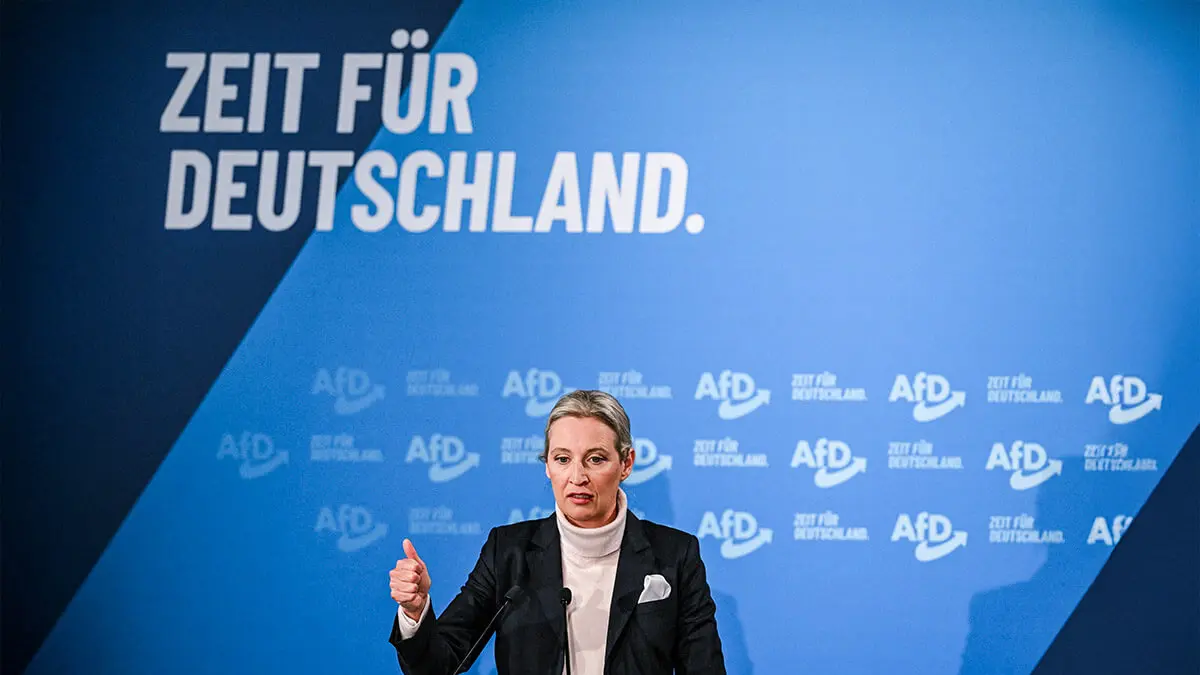Crucial elections for Europe in Germany

All of them have in common the demonisation of the political party that almost all the polls predict will become the second strongest force in the country, Alternative for Germany (AfD, 21%) behind the Christian Democrats (CDU-CSU, 29%), but well ahead of the Greens (DG, 16.5%) and the Social Democrats (SPD, 16%), with the Liberals (FDP, 4.5%) at risk of being left out of the Bundestag if they do not reach 5% of the vote, the minimum required to enter the German Parliament.
All the protests agree in labelling AfD as a far-right party and even as an heir to Hitler's Nazism, a label that would be enough not only to apply the corresponding cordon sanitaire (Brandmauer) to it, but even to ban it.
On the other hand, there are few, if any, analyses that investigate the causes of the meteoric rise of the AfD and the growing popularity of its leader, Alice Weidel, who has been catapulted during this election campaign by the social network X, in which its billionaire owner and current special adviser to President Donald Trump for the Efficiency of the Administration, Elon Musk, supports her and cheers her on with unusual enthusiasm.
The AfD programme and its promises are based on three main pillars: to put an end to illegal immigration, and even to reject asylum seekers, to apply radical measures to overcome the country's economic crisis and, closely related to this, to cut aid to Ukraine.
The so-called engine of Europe is running on empty and, in the opinion of AfD, the causes can be found both in the policies of the two major parties, CDU-CSU and SPD, and in the compulsive demands of the European Union which, if not cancelled, threaten to make the economic crisis insoluble, with the consequent explosions of unemployment and public services.
According to the polls, the man tipped to be the next chancellor of Germany, the Christian Democrat Friedrich Merz, took the step last week of joining AfD in three votes in the Bundestag, all aimed at tightening immigration policy. Several CDU MPs did not follow Merz's lead and the proposals were defeated by a narrow margin. But both the majority in the parliamentary chamber and public opinion attributed this defeat exclusively to Merz, ‘for having opened the gates of hell’ to an alliance with the far right.
The virulence of the political debate has risen several notches since then. While the still-chancellor Olaf Scholz and his spokespeople strive to remind Merz that the interparliamentary agreement not to make pacts with the far right dates from 1947, the spokespeople of the CDU-CSU counteract that ‘historical memory’ by contrasting the agreements reached by the SPD with Sahra Wagenknecht's BSW neo-communists in Saxony and Thuringia. And even, going back further than 1947, the leader of the CSU, Markus Söder, has reminded the Socialists of their responsibility in the fall of the Weimar Republic, which led to Adolf Hitler coming to power in 1933, with all that came after.
As the former director of Euronews, Luis Rivas, explains in Vozpópuli, ‘the veto and demonisation of Weidel by her rivals in Germany and Europe can be broken, as has already happened in Austria, the Netherlands and Italy’. For this to happen it is enough for the AfD's ‘iron lady’ to point to the indisputable increase in crime and terrorist acts committed by illegal immigrants or even by refugees with unexecuted expulsion orders, and the economic and financial threats hanging over Germany.
Although Weidel was not at the last ‘summit’ in Madrid of the parties that make up the Patriots group of the European Parliament, there is an evident harmony between their postulates and those of AfD, all of them in good harmony with the new Trump Administration.
On the other hand, the cancellation that ‘wokism’ applies to those who do not agree with its exclusive creed is difficult to extend to Weidel. This lady lives with her partner and their two children, a woman originally from Sri Lanka, and she has been such a firm defender of the LGBTI community that surveys within the community show that they prefer her much more than they do ecologists and social democrats.
And, with regard to the European Union, the AfD blames it for having caused the crisis both with the decision to cut the supply of Russian gas and oil, and for imposing sanctions on the Kremlin that are ‘extremely damaging’ for Germany. The EU has also been the main contributor of European funds to Ukraine, which has contributed to further increasing the deficit and the debt, chapters which would otherwise require a qualified majority in the Bundestag for their reform and expansion.
The elections on 23 February will largely determine the future of Germany and, consequently, of an EU that needs to reach an agreement as soon as possible in order to join the new international order that is already underway.



